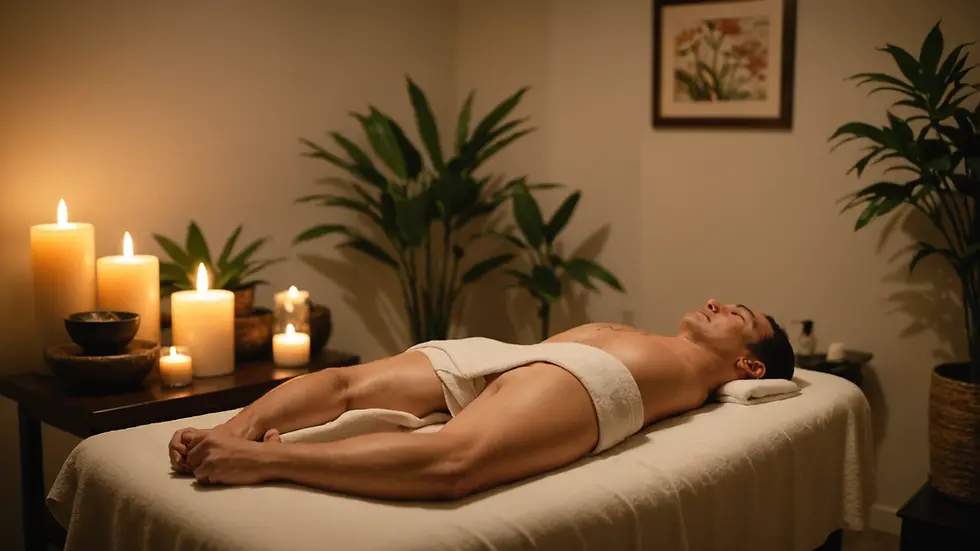Exploring the Benefits of Massage Therapy: What You Need to Know
- ntsourkan

- Jan 20, 2025
- 4 min read

Massage therapy is more than just a luxury; it's a powerful tool for enhancing your health and wellness. In recent years, its popularity has soared as more people recognize the significant benefits it provides. When you think of massage therapy, you might picture relaxation and pampering. However, it offers many benefits that can improve both physical and mental well-being. This post examines the key advantages of massage therapy and provides valuable insights for those considering adding it to their health regimen.
Understanding Massage Therapy
Massage therapy is the practice of applying pressure to muscles, tendons, and ligaments to encourage relaxation and enhance overall health. There are various types of massage, such as Swedish, deep tissue, and sports massage, each tailored to address specific needs. For example, a sports massage may focus on enhancing athletic performance and preventing injury, while a Swedish massage is typically designed for relaxation.
Historically, massage has been a part of many cultures for centuries, and modern studies reinforce its effectiveness in pain management, stress reduction, and improved mobility.
Physical Benefits of Massage Therapy
Pain Relief
One of the standout benefits of massage therapy is its ability to relieve pain. Whether you deal with chronic pain, tension headaches, or soreness from physical activities, massage can help. For instance, a study from the American Academy of Pain Medicine found that patients receiving regular massage therapy reported a 30% decrease in pain sensations over three months. Techniques like deep tissue massage work on deeper muscle layers, providing relief from pain related to injuries or ongoing issues.
Improved Circulation
Another key benefit of massage therapy is improved circulation. Massage stimulates blood flow, helping deliver oxygen and nutrients to cells throughout the body. According to the Mayo Clinic, enhanced blood circulation can aid in faster recovery from injuries. For individuals recovering from surgery or injury, increased blood flow can promote healing and facilitate rehabilitation.
Additionally, improved circulation can be beneficial for reducing muscle tension and lower blood pressure. Research published in the journal Circulation shows a link between regular massage therapy and decreased systolic blood pressure rates, contributing to heart health.
Enhanced Flexibility
Regular massage can significantly improve flexibility, which is critical for everyone, especially athletes. Tight muscles can limit motion and increase the risk of injury. A study by the University of North Carolina found that participants who received massage therapy twice a week showed a 20% increase in flexibility compared to those who did not. By helping to release muscle tension, massage therapy provides a broader range of motion and improves overall physical performance.
Mental Benefits of Massage Therapy
Stress Relief
In today’s hectic world, managing stress is essential. Massage therapy creates a conducive environment for relaxation, leading to lower anxiety levels. A study published in Psychosomatic Medicine showed that individuals who received regular massages had a 60% decrease in levels of cortisol, a stress hormone. This significant reduction helps promote feelings of calmness and mental clarity, providing a necessary break from daily pressures.
Improved Sleep Quality
Getting quality sleep is vital for overall health. Research indicates that regular massage therapy can improve sleep patterns. In a study conducted by the University of Virginia, participants who received massage therapy reported a 30% improvement in sleep quality. The relaxing effects of massage help calm the mind, making it easier to fall asleep and stay asleep. Individuals dealing with insomnia can particularly benefit from this restorative practice.
Other Notable Benefits
Enhanced Immune Function
Regular massage therapy can be a boon for your immune system. Studies suggest that individuals who receive massages frequently experience a boost in immune function. For example, research led by the University of Massachusetts found that people who received massage therapy experienced a 50% increase in the number of natural killer cells, which help fend off sickness.
Improved Posture
Poor posture is a common issue, especially for those who spend hours at a desk. Massage therapy can correct muscular imbalances that lead to bad posture. By reducing tension in tight muscles, massage encourages the body to realign naturally, resulting in improved posture. Proper posture can alleviate pain and discomfort, contributing to better physical well-being.
Enhanced Mental Clarity
Massage therapy may also boost mental clarity and focus. By reducing stress and improving blood flow to the brain, many individuals report feeling more alert and refreshed after a session. This invigorated state can improve productivity and creativity at work and home, leading to better problem-solving and decision-making.
Choosing the Right Massage Therapy
When it comes to massage therapy, choosing the right type is essential for maximizing benefits. Here are factors to consider:
Identify Your Needs: Clearly assess whether your primary goal is pain relief, stress reduction, relaxation, or improved flexibility.
Research Techniques: Familiarize yourself with various techniques to discover which best meets your needs. Each type of massage focuses on different aspects of health.
Select a Qualified Therapist: Choose a licensed therapist who is experienced and understands your health history. Communication is vital; let them know about any medical concerns or areas of discomfort.
Final Thoughts
Incorporating massage therapy into your regular health routine can lead to numerous physical and mental benefits. From significant pain relief and improved circulation to enhanced mental clarity and posture, the advantages are substantial. As you explore different options, make sure to prioritize qualified professionals and communicate your needs clearly.
By committing to regular self-care through massage therapy, you not only find relief from physical discomfort but also cultivate a greater sense of balance and well-being in your life.




Comments